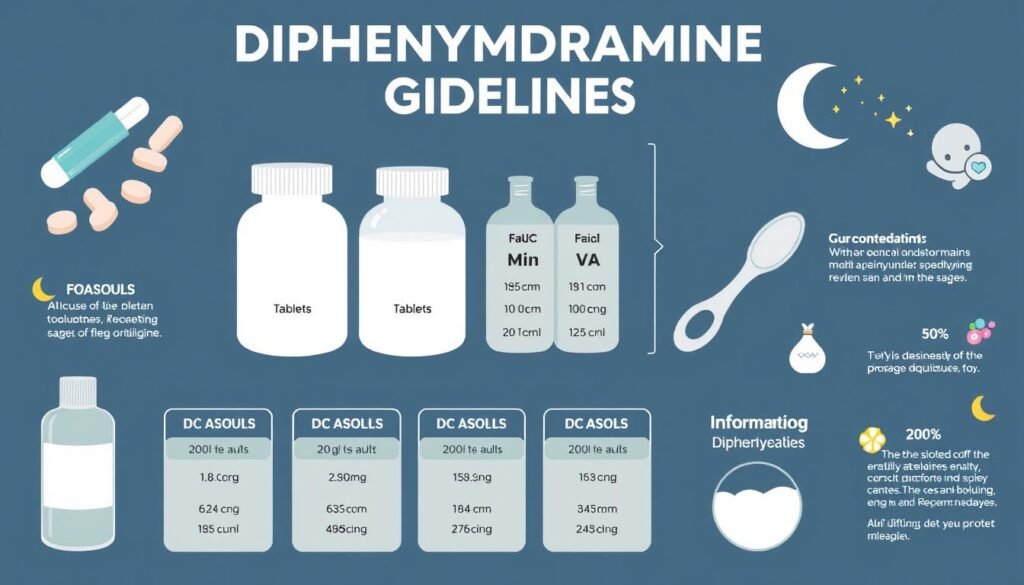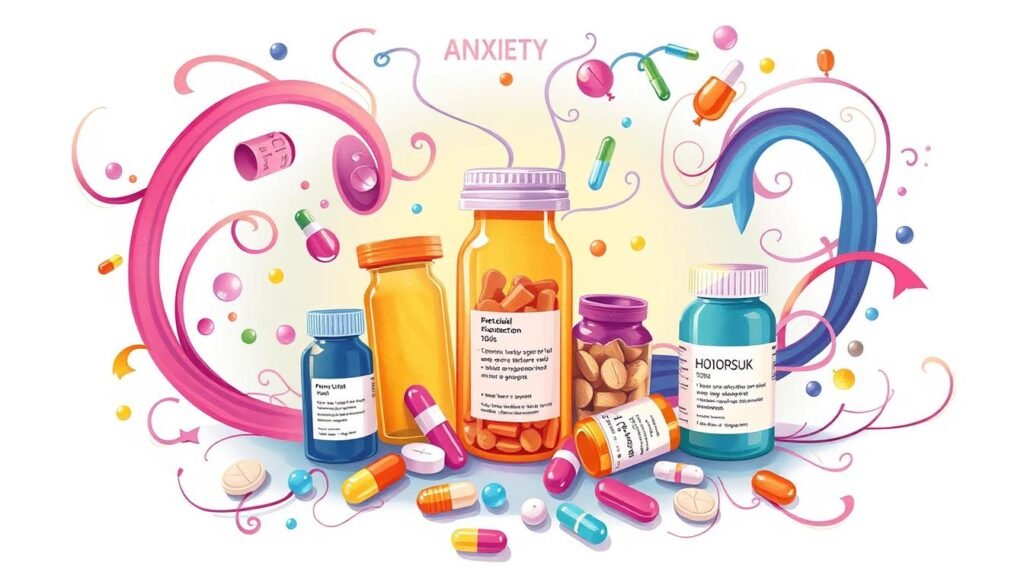Did you know over 40 million US adults battle anxiety disorders yearly? The search for effective treatments has many people looking beyond standard prescriptions. Here comes diphenhydramine, better known as Benadryl. This well-known over-the-counter antihistamine interests those seeking a possible OTC anxiety remedy. Though it’s mainly for allergies, its calming effects make some view it as a non-prescription option for anxiety.
Looking into diphenhydramine for anxiety means weighing its pros and cons. It provides quick calm, which sounds great for instant relief seekers. Yet, is it a true fix for anxiety? Concerns about its side effects, especially in older adults, call for a cautious approach. This article dives deep into this topic. It balances the potential benefits with medical advice on its use. For more details, check out in-depth info on diphenhydramine’s role in anxiety management.
Key Takeaways
- Diphenhydramine is widely recognized for its antihistamine properties but lacks FDA approval for anxiety treatment.
- For adults, typical dosages range from 25 to 50 mg every 4 to 6 hours as needed.
- The long-term effects of diphenhydramine may pose risks, particularly for older adults over 65.
- Consultation with a healthcare provider is crucial before using diphenhydramine for anxiety management.
- Alternatives such as hydroxyzine are FDA-approved for anxiety and may offer fewer side effects.
Understanding Diphenhydramine
Diphenhydramine is known for treating allergy symptoms. It blocks histamine to ease stress responses in the body. Its sedative effects also make it a go-to for those needing help to sleep.
What It Is and How It Works
Diphenhydramine stops histamine receptors from working. This helps stop sneezing, runny nose, and itchy eyes. The result is a calming effect helpful for sleep troubles or stress.
About 32% of Americans face anxiety disorders sometime. While some use diphenhydramine for anxiety, it’s not officially approved for this. Hydroxyzine is the antihistamine approved for anxiety.
Common Uses of Diphenhydramine
Diphenhydramine is mainly for allergies, but it has other uses too:
- Helping with the common cold
- Easing motion sickness
- Managing occasional sleeplessness
It might offer some help for mild anxiety. Yet, medicines made for anxiety are usually more effective. Using diphenhydramine for anxiety could cause:
- Drowsiness
- Dizziness
- Constipation
- Blurred vision
- Dry mouth, nose, or throat
Diphenhydramine is easy to get without a prescription. This makes it different from many anxiety drugs which need a doctor’s note. Before trying it for anxiety, talking to a healthcare provider is key.
Antihistamines and Anxiety: A Brief Overview
Antihistamines are important in managing allergies and sometimes anxiety. They work by interfering with how the body responds to certain triggers. This process can help those looking for help with anxiety related to histamine.
How Antihistamines Work in the Body
Antihistamines block the parts of cells that react to allergens, helping stop allergic reactions. This blocking can also relax the body. Because of this, medications like diphenhydramine are considered for treating anxiety. However, they offer temporary relief and don’t tackle anxiety’s root causes.
Diphenhydramine’s Sedative Effects and Anxiety
Diphenhydramine helps with sleep and relaxation, which may ease mild anxiety. It brings calm to those experiencing acute anxiety or panic. Yet, its suitability for anxiety relief differs among individuals, and it shouldn’t be the primary option for treatment. Long-term use could lead to dependency and less effectiveness. Side effects like sleepiness, dry mouth, and feeling dizzy are common. This highlights diphenhydramine’s potential and considerations for its use over time.
Diphenhydramine for Anxiety: Benefits and Risks
Anxiety impacts many people around the world, making daily activities harder. Diphenhydramine, also known as Benadryl, is a common solution. It is an over-the-counter tranquilizer that can help relax you. This effect starts working 15 to 30 minutes after you take it.
Potential Benefits of Using Diphenhydramine for Anxiety
Many find quick relief from anxiety and better sleep with diphenhydramine. This medicine is mainly for allergies but also helps with anxiety. It’s easy to get and works fast for sudden anxiety moments. More info can be found through consultation sources.
Risks and Side Effects to Consider
However, using diphenhydramine comes with risks. It can cause drowsiness, dizziness, or even confusion, especially in older adults. It’s not FDA-approved for treating anxiety. This adds to worries about its long-term safety and effectiveness. Experts advise being careful with it to avoid becoming too dependent. A deeper look into its use for anxiety is available at professional reviews.
Other Over-the-Counter Options for Anxiety Relief
If you’re looking for anxiety relief, there are many over-the-counter options besides diphenhydramine. While Benadryl is well-known, the market is full of other remedies. These alternatives show promise as OTC anxiety solutions.
Comparing Benadryl with Other OTC Anxiolytics
Over-the-counter anxiolytics, including Benadryl, claim to calm anxiety. However, their effectiveness varies greatly. Researching different treatments can show us how natural supplements might work better for some people.
| Product | Type | Effectiveness | Safety Profile |
|---|---|---|---|
| Benadryl | Antihistamine | Moderately effective | Can cause drowsiness, dizziness |
| Kava Kava | Herbal | Reduced anxiety symptoms | Potential liver toxicity |
| Valerian Root | Herbal | Improves brain function linked to anxiety | May cause stomach upset |
| CBD | Natural Calm Supplement | Effective for general anxiety | Minimal side effects |
Herbal and Natural Alternatives for Anxiety Management
There’s more interest in herbal solutions like passionflower, ashwagandha, and holy basil. These natural alternatives typically have fewer side effects than drugs. But remember, it’s best to talk to a doctor before trying them.

Clinical Perspectives on Diphenhydramine for Anxiety
Diphenhydramine is often known by its brand name, Benadryl. It’s a topic of debate among doctors for treating anxiety. Though it might help temporarily because it makes you sleepy, it’s not good for the long run. Doctors prefer other methods like SSRIs or talking to a therapist. They worry about the dangers of using antihistamines too much.
What the Medical Community Says
Experts are careful about using diphenhydramine, like Benadryl, for anxiety without a prescription. Some people do feel better using it. But, making such a choice is serious. There’s little proof it actually works for anxiety. Doctors suggest proven treatments as the best option for anxiety.
FDA Approval Status and Safety Concerns
The FDA hasn’t given the green light to use diphenhydramine for anxiety. This tells us there’s not enough proof it works. Especially older adults need to be cautious as it might affect their thinking over time. If you’re thinking about it for anxiety, talk to a healthcare pro first. They’ll help you choose wisely and safely.
Dosage Guidelines and Usage Recommendations
Knowing the right amount of diphenhydramine is key to staying safe and getting the best results. The recommended dose can change depending on what it’s being used for and how old the patient is. It’s important to talk to a healthcare provider to get advice that’s just right for you.
Typical Dosages for Allergy Symptoms
Here’s a chart showing how much diphenhydramine people usually take:
| Condition | Adult Dosage | Children’s Dosage (under 12 years) |
|---|---|---|
| Allergy Relief | 25 mg to 50 mg every 4 to 6 hours | 12.5 mg to 25 mg every 6 to 8 hours (based on weight) |
| Insomnia | 50 mg once daily before bedtime | 50 mg once daily before bedtime (for ages 12 and older) |
| Motion Sickness | 25 mg to 50 mg half an hour before travel, repeat every 6 to 8 hours | 12.5 mg to 25 mg as recommended |
Consulting with Healthcare Professionals
Talking to a health expert before starting diphenhydramine is a must. This step makes sure you’re in good health to take it, checks for risks with other medicines, and helps figure out how much you should take. If you have health concerns like breathing problems, liver or kidney disease, or heart issues, being extra careful is important.

The Role of Diphenhydramine in Sleep Aid
Many people have trouble sleeping because of anxiety. For them, diphenhydramine can be a helpful sleep aid. Its sedative effect makes it easier to fall asleep. But, using it too much might disrupt natural sleep patterns.
Using Diphenhydramine as a Sleep Aid for Anxious Nights
Diphenhydramine is well-known for fighting allergies. It’s also used to tackle anxiety-induced insomnia. A study showed that 52.1% of participants used it to combat insomnia. However, long-term use can lead to tolerance, making it less effective.
Effects on Sleep Quality and Anxiety Symptoms
Diphenhydramine can help you fall asleep, but it might not improve sleep quality for everyone. Over time, some find their sleep more broken. Also, dizziness is a common side effect. This is why considering other treatment options could be beneficial. These alternatives avoid the negatives of first-generation antihistamines.
| Effect | Potential Outcome |
|---|---|
| Improved Sleep Onset | Short-term relief for insomnia |
| Disrupted Sleep Patterns | Long-term issues with sleep continuity |
| Dizziness | Increased risk of falls or injuries |
| Tolerance Development | Reduction in sedative effects over time |
Finding the right solution for sleep issues and anxiety can greatly improve your health. Always be careful, especially if you’re taking other medications or have health problems. Talking to a doctor can help make using diphenhydramine for sleep challenges safer and more effective.
Potential Drug Interactions with Diphenhydramine
It’s vital to know how diphenhydramine interacts with other drugs. This medicine, also called Benadryl, can mix badly with certain medications and health issues. Knowing about these can help avoid harmful effects and make treatment safer.
Common Interactions with Other Medications
Some medications can cause problems if taken with diphenhydramine. Blood pressure drugs, antidepressants, and sedatives might make side effects like sleepiness worse. This could lead to dizziness and trouble moving. Doctors should know all the medicines a patient is taking to prevent these issues. For more info on diphenhydramine interactions, it’s best to talk to a healthcare expert.
Alcohol’s Effects When Combined with Diphenhydramine
Mixing alcohol with diphenhydramine is dangerous. Drinking while taking this drug can make you much sleepier. It can also cause serious problems like slow breathing and bad coordination. This mix can be very risky, especially when you need to be alert. It’s safest to avoid alcohol with diphenhydramine.

Personal Use and Experiences with Diphenhydramine
People have different stories about using diphenhydramine for anxiety. Many have found it helpful for short-term relief. Yet, some point out its downsides. For a few, it brings a peaceful break during stressful times.
Subjective Reports from Users
User feedback varies widely. Some praise diphenhydramine for easing their anxiety. Yet, not everyone is happy. Some complain about feeling too sleepy or having a dry mouth. These reactions show how personal experiences can differ.
Understanding the Limitations of Self-Medication
Using diphenhydramine without a doctor’s advice has its drawbacks. It’s not officially accepted for treating anxiety. Relying on it too much can stop people from seeking better treatments. For long-term users, especially the elderly, there are risks such as dependency or side effects.
It’s crucial to talk to a doctor before trying diphenhydramine. Knowing its limitations helps in making safer choices. Managing anxiety might need more than just medication. It could require therapy, changes in lifestyle, or different drugs. For anyone thinking about using diphenhydramine, asking for professional help is key.
Conclusion
Diphenhydramine may seem like a good choice for anxiety, but it comes with risks and side effects. It works fast, reaching its peak in about two hours. But it can also cause drowsiness and dizziness. People with health issues should be extra careful.
Before using diphenhydramine for anxiety, talking to a doctor is crucial. The right dose can vary a lot from person to person. While it can help in the short term, looking at the whole picture is important. Combining it with Cognitive Behavioral Therapy (CBT) and SSRIs is better for the long run.
Using diphenhydramine wisely can help with anxiety for a short time. However, getting a personalized plan from a professional is key. This approach helps find lasting anxiety relief. It leads to better ways to cope and improves mental health overall.